Editor’s Note: Covid-19 cases are rising across the United States and travel can increase your risk. “Staying home is the best way to protect yourself and others from Covid-19,” the CDC says. The agency offers resources for travel risk assessment.
There’s no “best way” to get across the United States during a pandemic.
So when I was faced with moving all my possessions from one coast to the other, while also working remotely, I could only hope my most affordable option – driving the 2,517 miles – was also the safest.
I had made the long road trip twice before from Los Angeles to Atlanta, where I had lived and worked the past five years, but never the other way. And never while working 10-hour international breaking news shifts from the road.
Luckily my roommate and fellow CNN producer Artemis Moshtaghian had been wanting to do a road trip back to our hometown of Los Angeles before she left Atlanta to work from New York – even if it meant practically sitting knees to chest in my passenger seat for an entire week on the road.
What we discovered along the way were unique work-from-anywhere opportunities, remote desert landmarks, spectacular landscapes and the lesson that wildlife could care less about social distancing. We also witnessed firsthand the patchwork and divisions of the US coronavirus response and met a wide range of characters that spanned from tremendously helpful to a little too cordial.
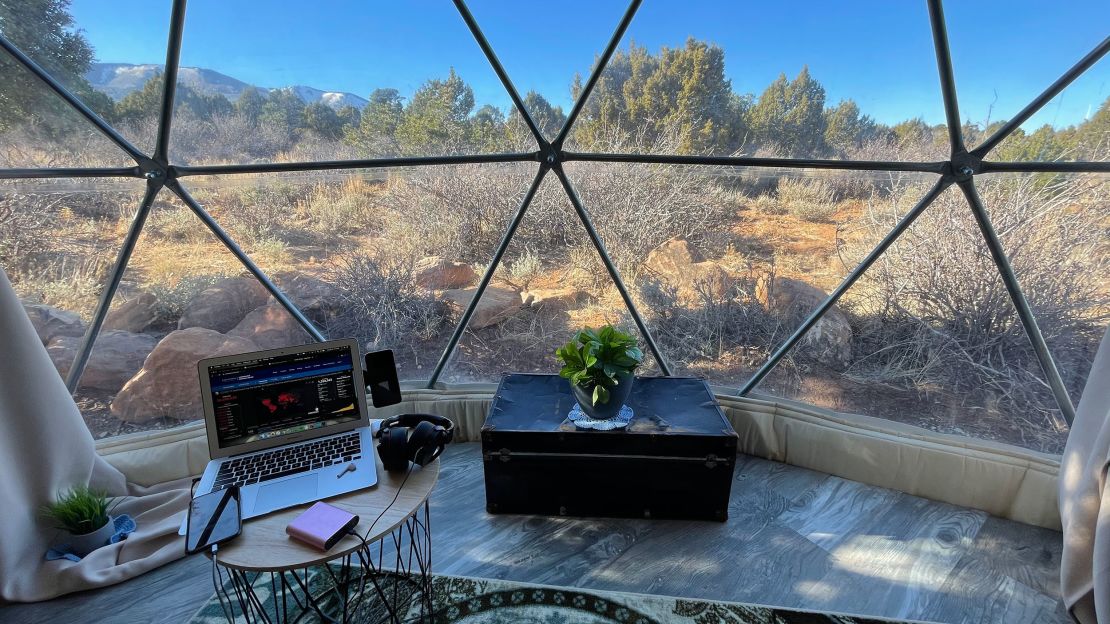
The New WFH: Working from everywhere
Contemplating how we would coordinate the chaos of our work calls, conference bridges and the multiple television feeds needed to monitor news from various locations, we did quite a bit of planning before heading out West.
First priority: Safety. Second priority: Wi-Fi.
Since we were leaving in the middle of November, we mapped out the most scenic fall route our journey had to offer.
Then we tried to book stays that were isolated from other people, had strict Covid-warranted cleaning requirements and were fairly remote, yet picturesque, so we could focus on our work while enjoying unique locations.
After checking CNN’s state by state travel restrictions, we planned our way to the Pacific Ocean and decided that a true coast-to-coast trip needed to start in a bucket list city we both wanted to visit before leaving the South: Charleston.
Fitting an entire apartment into my Hyundai Accent, which is lovingly called Darth Vader, was the first major feat. The rest we learned mostly through trial and error, armed at the very least with a surplus of the basics – masks, gloves and hand sanitizer.
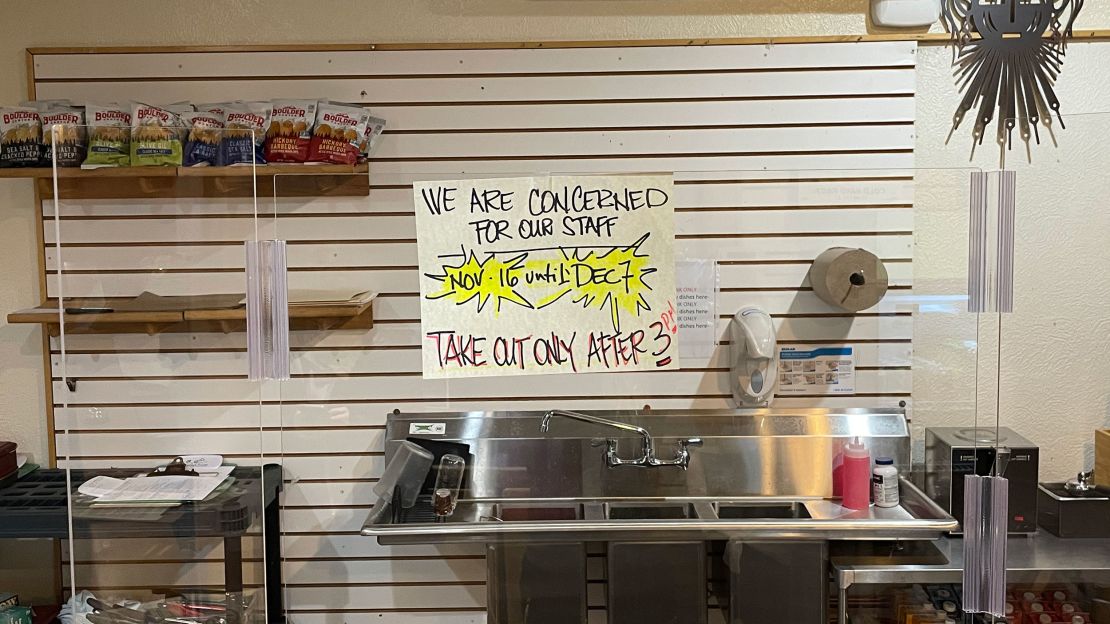
14 states and 14 shades of Covid awareness
Our scenic route would take us across the 13 states standing between us and California: South Carolina, Georgia, Alabama, Mississippi, Tennessee, Arkansas, Oklahoma, Texas, New Mexico, Colorado, Utah, Nevada and Arizona.
Acutely aware of coronavirus cases surging across the US, we were wary of how seriously people were taking (or not taking) preventative safety measures along the way.
As we traveled from state to state we became aware of each state’s interpretation and implementation of Covid-19 safety measures.
It appeared as though regulations were respected by the general public more strictly as we trekked from the Southeast to the West Coast. Essentially, the further West we went, the safer we felt.
Nearly every gas station we stopped at had signs requiring mask usage, though not every stop had employees or customers honoring those requirements.
Thankfully, filling up our gas tank and our coffee cups presented calculated risks we had already prepared for with our abundance of sanitizing wipes and face masks.
Starting in the South: Masks optional
Starting our journey in South Carolina, we encountered what we soon realized was the norm for many Southern states: optional mask usage.
While most restaurants in Charleston followed social distancing guidelines, the number of Covid-abiding patrons was far fewer than the number of establishments that were taking precautions.
In Georgia, where we had worked together the past five years and lived together as roommates for two, people are still sharing memes of maskless non-socially distanced parties that began in the summer, especially in Atlanta.
Making our way through the Southeast, we came across all kinds of characters. In one small town in Mississippi, locals told us they hadn’t seen “outsiders” for quite some time.
While we squeezed in a quick roadside workout across from Flick’s gas station, a man who drove up in his pickup truck didn’t hesitate to come a little too close for Covid-comfort to ask us about our travels.
In Oklahoma, on our way out of Oklahoma City, we stopped at Sid’s Diner, a landmark old-school establishment that Artemis had scouted along Route 66 with a famous local “onion burger.”
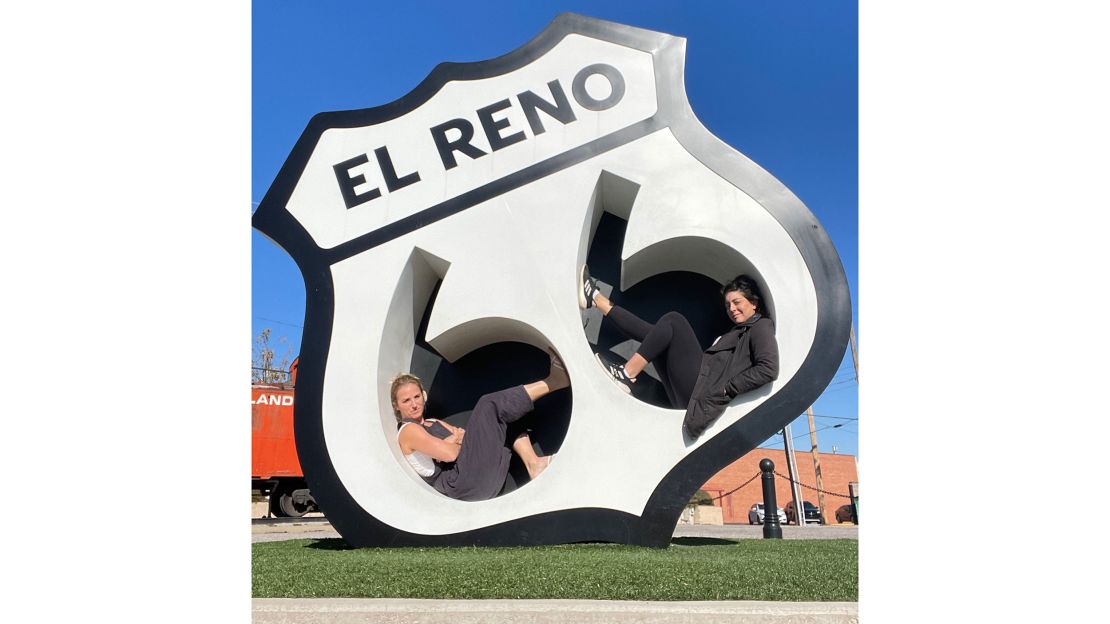
The staff was completely masked, cooking and serving food from behind acrylic glass to protect their employees while local customers sat non-socially distanced and maskless. We quickly chomped down on Sid’s artfully crafted cheese and onion burger with a large side of fries.
As we continued on our journey, the only place we didn’t see signs showing a mask requirement was at a stop for coffee in Texas, where the employee only put a mask on after we approached wearing ours.
At that same stop we received stares from other customers and a comment from the elderly gentleman behind the counter who said playfully, “I can’t see your whole face, but your eyes sure are pretty.”
Concerned that we were the only ones in the public space wearing masks, we thanked the man, avoided the self-serve coffee items and hit the road.
Westward bound: Same concerns, mixed reactions
Our route dipped us into New Mexico for only one hour before crossing state lines into Colorado.
In that limited time, we received a cautionary emergency alert on our phones: “N.M. COVID-19 update: shelter in place except for emergency needs. EXTREME virus risk.” We didn’t need to make any stops to discover what this alert meant.
It was just across the state line into Colorado that we met Allen Clay, a gas station assistant manager who shared our concerns on Covid-19.
He explained how he’d been called racial slurs for enforcing the state’s mask mandate inside his store. Clay said he’s had two relatives die from Covid-19 and had to beg his managers to put hand sanitizer inside the store for customers to use.
Although there’s a state order in Colorado to wear a mask, Clay said since it’s not an actual law there’s no way to enforce it.
“When someone coughs in my store, I ask them to put on a mask,” he said, “putting myself in the direct line of fire for peoples’ conspiracy theories and anti-Covid opinions.”
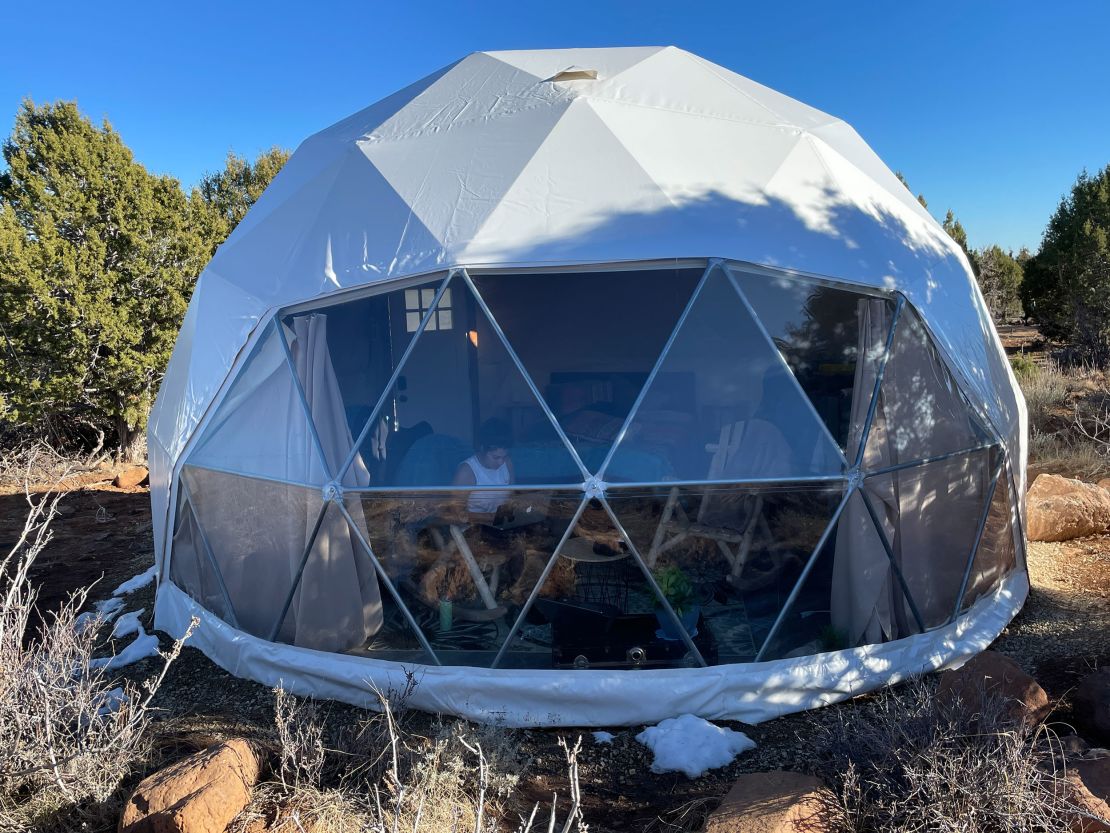
The Mothership: Juggling travel and work-life balance
We had to find lodging that was suitable for sleeping, adventuring and working.
Covering breaking news for CNN requires a few necessities – the three S’s, if you will: Strong Wi-Fi, strong coffee and a strong sound barrier that could handle the noise of calls, conference bridges and several television feeds airing simultaneously on four laptops.
With these requirements in mind, the remoteness and spaciousness of geodomes caught our attention. These spherical structures provided the space we were looking for after hours of being cramped in a small car.
In Colorado, we stayed in a large Airbnb geodome called The Mothership Dome, which had surreal scenery that helped clear our minds, but not necessarily the infrastructure to comfortably execute our hectic day.
We found ourselves in a similar situation in Utah, where another desert geodome gave us the solitude and Wi-Fi we needed to focus, but lacked amenities such as running water in the geodome itself and the coffee that we needed to thrive.
Worn out by driving, lack of sleep, the intensity of our work shifts and this lack of access to basic amenities, we decided to book a hotel near Zion National Park for the last two nights of our road trip.
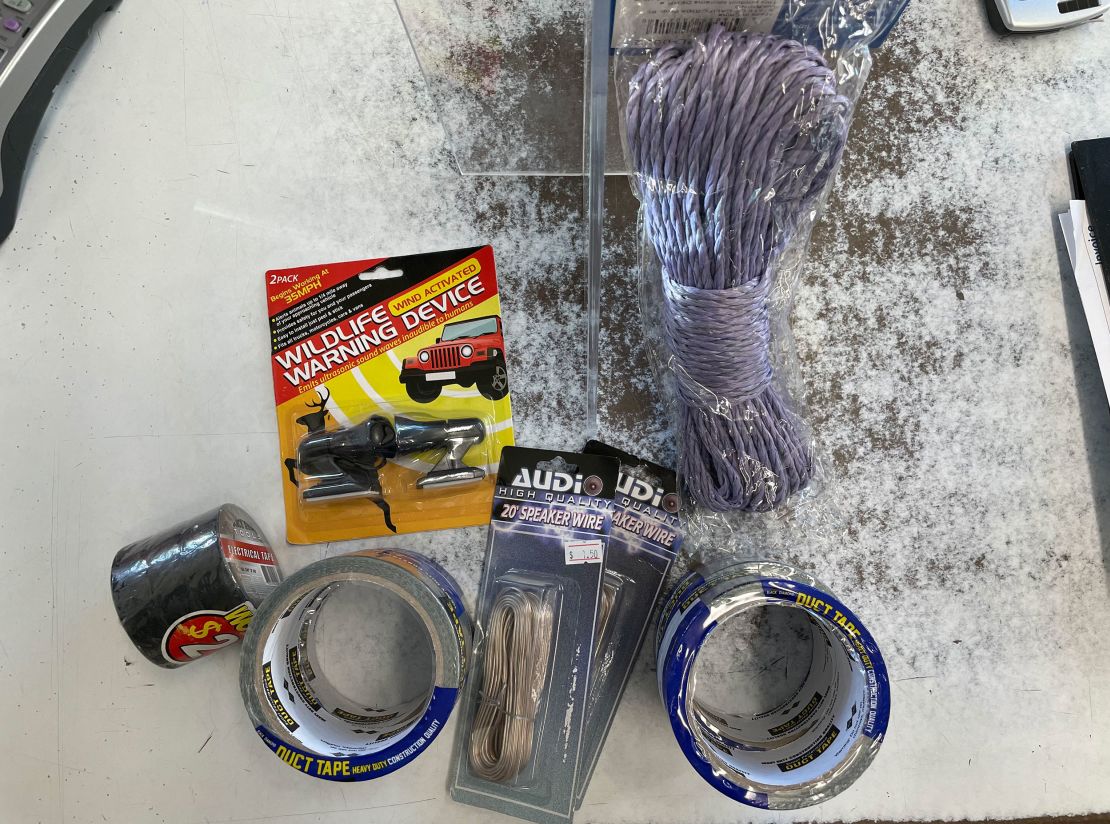
Wildlife: The only population unconcerned with Covid-19
More than halfway through our cross-country trip we were making good time, had just had an oil change and only had one more stop and 800 miles to go before reaching Los Angeles.
We felt prepared to handle anything that came our way, including driving through Colorado’s winding mountainous terrain at night. That’s exactly when we ran into trouble, literally.
We hit a member of the only mass population unconcerned with Covid and something we definitely didn’t see coming: a large deer.
The unfortunate encounter left a sizable dent in the hood, took out our side mirror, passenger headlight, and left the front bumper dragging on the ground. But after the impact, we were still moving and there was no damage to the engine. So onward we went.
As for the deer, we filed a report with Colorado State Police but were unable to locate him in the darkness of the woods after the impact.
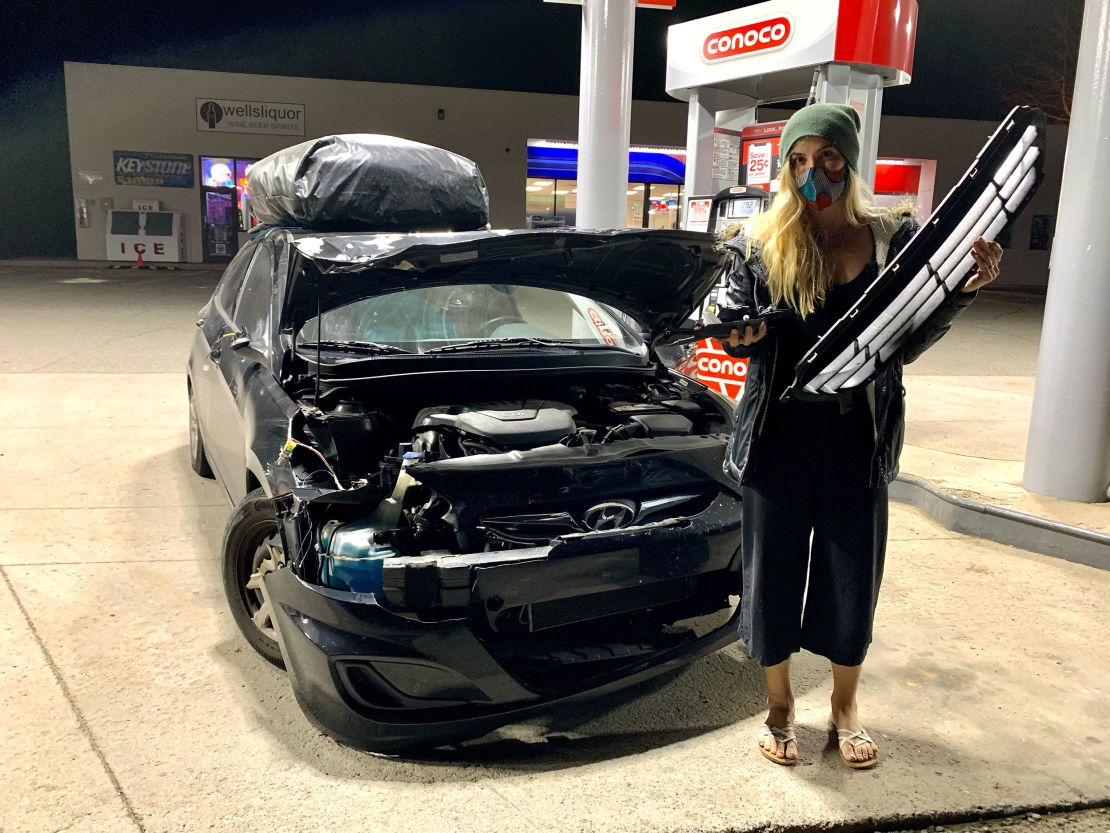
We dragged the bumper 15 miles down the road without crashing and were fortunate to get help at a gas station just before it closed. A local mechanic helped to string up and tape the bumper enough for us to make it to our next destination in Monticello, Utah – about 120 miles away.
Secured with sparkly duct tape and tied together with audio wire, our car drew attention everywhere we went and prompted continued offers of help across the entire state of Utah.
Strangers at every gas station shared their own experiences with this type of collision and offered advice for how to maintain our patched-up vehicle.
Along with Covid supplies, we learned that every road trip preparation kit needs to include duct tape, zip ties, audio wire and extra rope.
Most importantly, we discovered the gift of a lifetime – an ultrasonic soundwave whistle for the hood of the car that is only audible to animals.
You’re welcome in advance to all our friends and family who will receive this lifesaving gift in their Christmas stockings this year.
America is rediscovering the great outdoors but businesses are struggling
Along the way, we spoke to people at roadside businesses in every state we stopped in who were struggling from the devastating impacts of Covid-19.
From the lack of customers at the Cherokee Trading Post in Oklahoma to the Twin Rocks Cafe on the Navajo Nation Reservation operating at half capacity, we saw more stories of struggle than success.
However, that wasn’t the case when we arrived at Utah’s Zion National Park, where they had just seen their busiest September ever with over 520,000 visitors, according to Zion National Park public information officer Amanda Rowland.
While preliminary numbers for 2020 have yet to be published, Rowland said the “increases in visitation observed in the past few months is part of a larger trend for Zion National Park and many other national parks.”
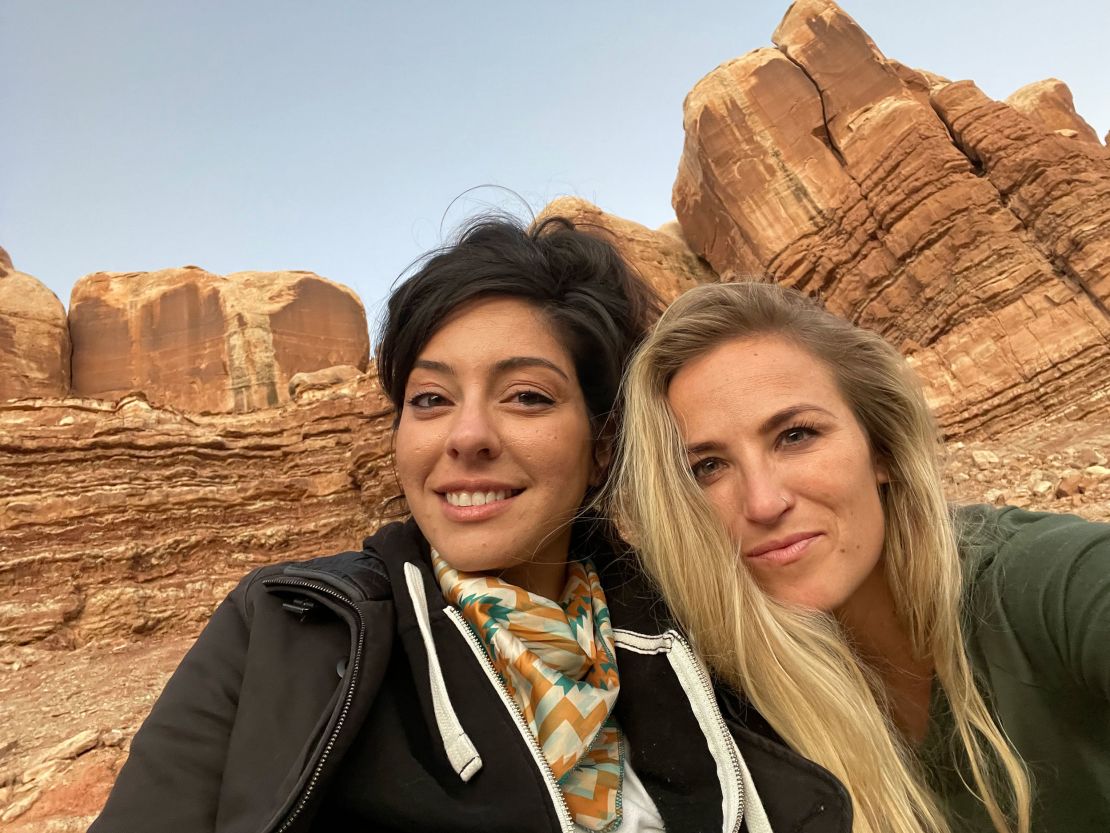
Home at last: West Coast is the best coast, baby
By the time we arrived in Los Angeles we were mostly in one piece, give or take the duct-taped parts on the car.
Artemis tested negative for Covid-19 and I quarantined with my family, neither showing nor feeling any symptoms of the virus. Feeling relieved and grateful to be Covid-free, we divided up our giant stash of disinfecting wipes and parted ways until our next adventure.
So if you need to move across the country or don’t want to risk flying just yet, we highly recommend road tripping.
We found it’s important to plan mindful stops, squeeze in roadside workouts, pack healthy snacks and be prepared for surprise encounters – whether human or animal.
Also go with family, a friend or co-worker who has the same sense of Covid caution and appreciation for adventure as you. Bon voyage and safe travels!










